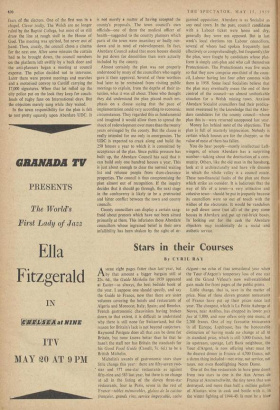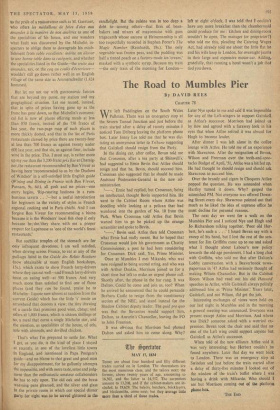Stars in their Courses
By CYRIL RAY AMERE eight pages fatter than last' year, but by that amount a bigger bargain still at 22s. 6d,, the Guide Michelin for 1959 appeared at Easter—as always, ,the best bedside book of the year. I suppose one should specify, and say the Guide to France, now that there are sister volumes covering the hotels and restaurants of Algeria and Morocco; Italy; Spain; and Benelux. French gastronomic chauvinism having broken down to that extent, it is difficult to understand why there is still none for Switzerland, but the reason for Britain's lack is not beyond conjecture. Raymond Postgate does all that can be done for Britain, but none knows better than he that he hasn't the staff nor has Britain the standards for his Good Food Guide (Cassell, 7s. 6d.) to be a British Michelin.
Michelin's awards of gastronomic stars show little change this year : there are fifty-seven two- star and 577 one-star restaurants as against fifty-nine and 583 last year, but there is no change at all in the listing of the eleven three-star restaurants, four in Paris, seven in the rest of France—tables memorables, gloires de la cuisine frangaise, grands vies, service impeccable, cadre elegant—no echo of that sensational year when the Tour d'Argent's temporary loss of one star and the Grand Wfour's now well-established gain made the front pages of the public prints.• Little change, that is, save in the matter of price. Nine of those eleven greatest restaurants of France have put up their prices since last year. The cheapest, which is La Petite Auberge at Noyes, near Antibes, has dropped its lower prix Are at 1,800, and now offers only one menu, at 2,200 francs. One of my favourite restaurants in all Europe, Lapdrouse, has the honourable distinction of having made no change at all in its standard price, which is still 3,000 francs, but its upstream, upstage, Left Bank neighbour, the Tour d'Argent, is now offering what must be the dearest dinner in France at 4,700 francs, not a damn thing included—not wine, not service, not taxes, not even floodlighting Notre Dame.
One of the fine restaurants to have gone down from two stars to one is the Aux Armes de France at Ammerschwihr, the tiny town that was destroyed, and more than half a million gallons of Alsatian wine in cask and bottle with it, in the winter fighting of 1944-45. It must be a blow to the pride of a restaurateur such as M. Gaertner, who offers les medallions de foies doles aux amandes a la manicure de nos ancetres as one of the specialities of his house, and one wonders what fault was discovered by the Michelin in- spectors to oblige them to downgrade his estab- lishment froth table excellente: merite an detour to une bonne table dans sa categoric, and whether the specialities listed in the Guide—the truite aux amandes, say, or the coq au coulis d'ecrevisses- wouldn't still go down rather well in an English village of the same size as Ammerschwihr (1,424 hommes).
But let me not toy with gastronomic fancies that are beyond my purse, my station and my geographical situation. Let me record, instead, that in spite of prices having gone up as the franc has gone down, so that Michelin's economi- cal list is now of places offering meals at less than 850 francs, instead of the 750 francs of last year, the two-page map of such places is more thickly dotted, and that in the list of Paris restaurants classed by price there are twenty-four at less than 700 francs as against twenty under 600 last year, and that six, as against four, include wine in the price. This, I must say, is rather more up my rue than the 3,200-franc prix fixe at Chataig- ner, the restaurant recommended by Bon Viveur as having been 'recommended to us by the Duchess of Windsor' in a self-satisfied little English guide {Wining and Dining in France with Bon Viveur, Putnam, 9s. 6d.), all gush and no prices—one entry begins, `Rip-roaring lustiness in a rum- bustious tavern . . .'—but a useful introduction for beginners to the variety of styles in French regional cooking and in Paris chichi. And I can forgive Bon Viveur for recommending a bistro because it is the Windsors' local fish shop if only because he/she/they share with me a proper respect for Lapdrouse as 'one of the world's finest restaurants.'
But suchlike temples of the stomach are for only infrequent devotions. I am well satisfied, when driving across France, to eat at any of the pull-ups listed in the Guide des Relais Routiers (now obtainable at many English bookshops, 15s.), which exists to show French lorry-drivers where they can eat well—and French lorry-drivers insist on eating well—at 500 francs. And very much more than satisfied to find one of (hose places (and they can be found, praise be to Michelin : I quote now almost at random from the current Guide) which has the little 's' inside an arrowhead that denotes a view; the tiny drawing of a carafe that promises good wine, cheap; and offers at 1,000 francs, which is sixteen shillings or so, a meal that earns a single Michelin star, and the mention, as specialities of the house, of eels, sole with almonds, and devilled chicken.
That's what I'm prepared to settle for, What I get, as you do, is the kind of place I stayed at recently, in one of the loveliest little towns in England, and mentioned in Papa Postgate's guide—and no blame to that great and good man for my disappointment, for he gallantly attempts the impossible, and with more taste,sense and judg- ment than the enthusiastic amateur collaborators he has to rely upon. The old oak and the brass warming pans gleamed, and the silver and glass in the private room in which our special dinner Party for eight was to be served glittered in the candlelight. But the cuisine was in too deep a debt to—among others—that firm of bean- bakers and mixers of mayonnaise with gum tragacanth whose success at Heinzmanship is all too respectfully recorded in Stephen Potter's The Magic Number (Reinhardt, 18s.). The only vegetable was frozen peas, and the pudding was half a tinned peach on a factory-made ice-'cream,' masked with a synthetic syrup. Because my train —the only train of the morning for London- left at eight o'clock, I was told that I couldn't have any more breakfast than- the chambermaid could produce for me: kitchen and dining-room wouldn't be open. The manager (or proprietor?) who told me this, pleading the Catering Wages Act, had already told me about the little flat he and his wife keep in London, for overnight jaunts in their large and expensive motor-car. Adding, gratefully, that running a hotel wasn't a job that tied you down.



































 Previous page
Previous page